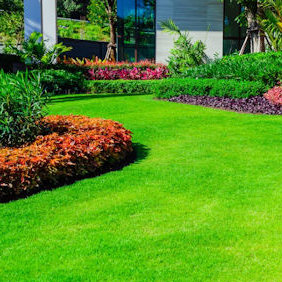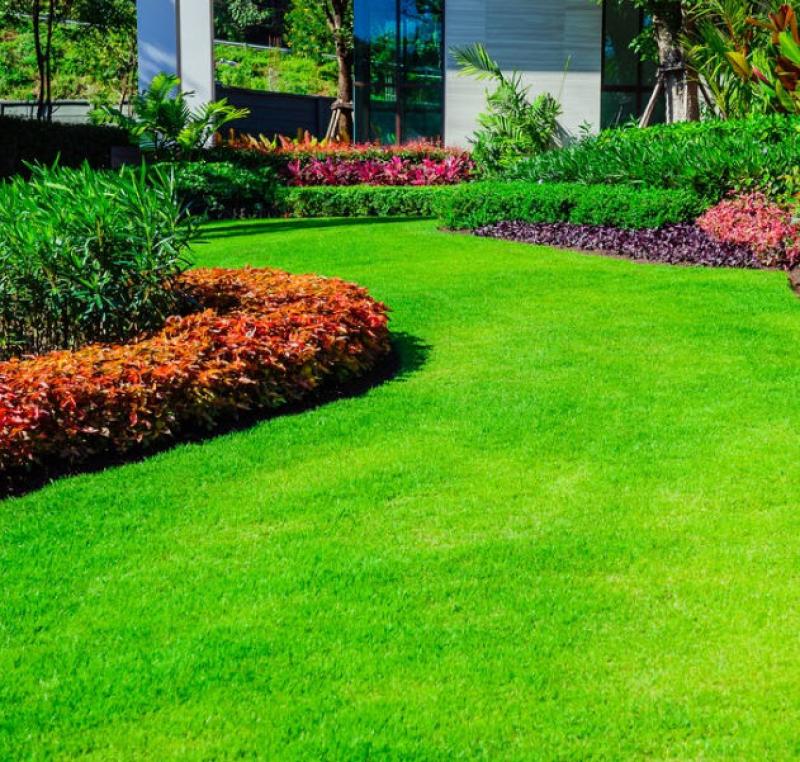A Short Guide to Transforming Your Lawn to Lush Green
by James Cummings on Jun 1, 2020
Can you use an upgrade of your lawn? If there are more weeds than grass on your lawn and you still have bare patches, no matter what you do, it may be time to do a total overhaul.
Here’s a quick guide to replacing an ugly lawn with a beautiful, lush green field of grass.
Find out the law problem
It's important to step back and look at the big picture before you start renovating your lawn. Taking a moment to figure out what the problem is might help you avoid similar issues after replanting. If grubs are the problem, for example, you'll need to treat them first.
But if you’re having ugly patches on your lawn because there isn’t much sunlight in parts of your yard, then it’s best using low maintenance ground coverings that do well in shade in place of the sun-loving grass you have there.

Or you may want to add landscaping features such as a firepit in places where the grass is struggling to grow. That'll have the additional advantage of reducing the amount of mowing that you intend to do.
Give your lawn a fresh start
Start from scratch when more than half of your lawn is screaming for help. Sprinkle your existing grass with a non-selective herbicide that kills all the vegetation that it touches.
Read and follow all instructions in the label, so you don’t inadvertently damage other beautiful garden plants or wildlife.
Mow the lawn low
After you have had a few days to work with the herbicide, mow the dead grass as fast as possible. It may sound counterintuitive to absolutely scalp your lawn to restore it, but this low mowing will keep the dead plants from covering your new lawn too far while keeping the remnants of their roots intact to deter erosion before fresh grass can grow.
Rake and rake again
Next, get a power rake to extract excess organic material and aerate the soil to allow your new lawn to take hold. Keep about 1/4 inch thatch on the ground (just the barest layer).
Rake off dead grass and any extras until you see dead grass stems and the bare soil is of equal amounts. Then spread a thin layer of compost over the soil, and evenly rake it in.
Seed the lawn
Now is the time to get new grass grown. If you are using seed, make sure to follow the instructions on the package to determine how much seed to use. The seed used must be the right amount. Using less than the required amount could make your lawn thin and scraggly.
Spread the seed evenly in all directions and make sure all every angle/direction is covered, so you don’t end up with bare spots in some areas.
If you install sprigs or plugs, it is simply a matter of digging small holes and plopping the plants in place. Cut a small trench to sprig and use a plug transplant tool. This little tool can usually be purchased from the same place you bought the plugs.
Water your new lawn well
You'll need to keep your renovated lawn moist once everything's planted. Be sure the soil isn't going dry for the first week or so after planting. The area should be moist - just the right amount of water (not soggy or dry)- once the grass starts to grow. It may mean watering (for short, five-minute applications) a couple of times a day. Don’t
After a few days or weeks, you can go for 10 to 15 minutes to a once a day watering. Watering evenly is also important so that your seed does not wash away, creating bare spots.
Feeding your renovated lawn
Start applying fertilizer or compost after the grass shoots to about an inch tall. This will spur its growth.
The same goes for sprigs and plugs: It is time for fertilizer if you want to use it after you see a few new shoots. Just be sure to wait for the growth, because if you fertilize too early you can burn roots.
Start mowing your new, repaired lawn
Give your grass it's first mowing when it’s around three inches tall. This will discourage weeds, and encourage your new grass to spread. That simple step makes a huge difference in the success of the project!
The first time you mow, be sure the mower blade is sharp; a dull blade might rip the seedlings right out of the ground. Then mow as you normally would, to keep the grass at the height you want it. For sake of the health of your lawn, during any one mowing round, make sure to don’t trim more than a third of the leaf length.
So there you have it! However, all these processes might seem a bit too much and complex for a DIY especially if you're a busy professional or business person. If you live in and around the city, hiring a reliable fill dirt and sod installation, for example, will ensure you enjoy a fast and flawless transformation of your lawn.
Popular Articles
Three Places to Spend Money on the Exterior of Your Home
When you have the exterior of your home remodeled, you are investing, time, energy and convenience into the project and you want to make sure that...
95724 Views
Homemade Headboards-Make an Upholstered or Wooden Headboard
Homemade headboards can add a lot of personality to any bedroom. They can be coordinated with existing furniture and room decor or they can be the...
74445 Views
When to Use a Brush, Roller or Sponge Brush
Brushes are a good choice for painting trim and woodwork. They are also useful for cutting in the edges around the top and bottom edges and corners...
71813 Views
Creating a Cottage Kitchen with Bead Board
Kitchen decor can range from modern and bold to elegant and elaborate by using strategic kitchen pieces. One of the most popular decorating trends...
52888 Views
Gas Fireplace Diagnostics and Troubleshooting
Follow these steps for diagnosing and troubleshooting Gas Fireplaces repairs. For the average DIYer, this may seem intimidating, depending on the...
30634 Views
Latest Articles
How Much Does It Cost To Take A Bath?
Plumbers know that a bath may seem like a relaxing luxury, but the real cost extends far beyond your water bill. The average soak uses 35 to 50...
on Apr 8, 2025
10 Concrete Patio Ideas on a Budget
A concrete patio can be a game-changer for your outdoor space. It is durable, versatile, and can be customized to fit your style. But what if you...
on Mar 25, 2025
Tips for Creating a Stunning Personalized Photo on Canvas
Order the unique beauty of a personalized photo on canvas and bring your memories to life. With a customized photo on canvas, you can transform...
on Mar 7, 2025
Best Areas to Buy Property in Singapore for Long-Term Growth
Singapore's real estate market remains one of the most stable and lucrative in the world. With limited land supply, strong governmental...
on Feb 18, 2025
Troubleshooting Excess Water in Your HVAC Secondary Condensate Drain Pan
When maintaining your air conditioning system, it is easy to overlook the condensate drain pan - until excess water starts pooling in places where...
on Jan 12, 2025
Featured Articles
What Type of Licensed Contractor Should You Hire?
on Feb 28, 2017
Hire Contractors / Estimates

Looking for a specialty project? There are many types of contractors available for your home improvement needs. Finding the right type of...
Sponsored Articles
Best Areas to Buy Property in Singapore for Long-Term Growth
on Feb 18, 2025
Real Estate / Finance

Singapore's real estate market remains one of the most stable and lucrative in the world. With limited land supply, strong governmental...
Actions
Top Categories
- Garden / Landscaping / Patio — 264
- Kitchen / Bathrooms — 240
- Real Estate / Finance — 203
- Appliance / Repair — 186
- Interior Design / Decor — 184
- HVAC / Air Conditioning — 148
- Cleaning / Maintenance — 144
- Improvements / Remodeling — 131
- Plumbing / Basements — 118
- Floors / Tile / Hardwood — 116
- Doors / Garages — 113
- Safety / Security — 113
Articles Archive
More DIY Articles
How to Create Ventilation System in the House by Yourself
Do I need ventilation in my private home? This question was not so topical until recently. Ecological "breathable materials", wooden windows,...
How to Know if Your Furnace Unit Needs to be Replaced
The right heating system will improve your comfort and safety, especially during the winter season. The best heating system will enhance the...
Is It Cheaper to Build Your Own Home?
Thinking of moving home? Have you ever sat and watched Grand Designs and drifted into a dream about building your own pad? Could it actually be...
The Three Rooms in Your House that Buyers Look at the Most
It can be a real challenge to get your house into the condition it needs to be in before it goes on sale. Nobody wants to have one of the houses...
Black Mold Inspection and Remediation in Your Home
Poor indoor air quality can overwhelm your home. Black mold is a primary indoor environmental concern for many homeowners. According to the...

